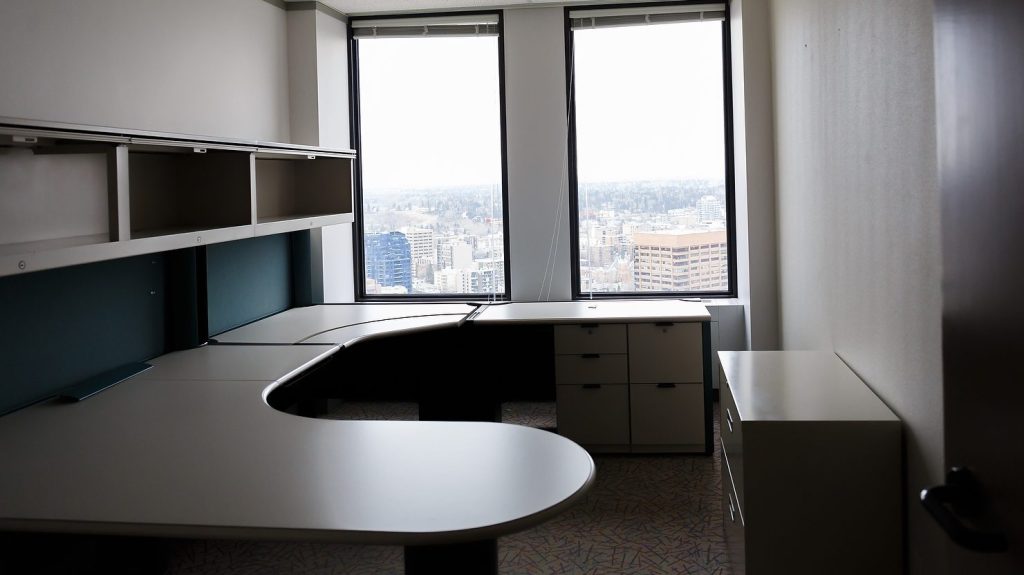What are the economic consequences of empty office spaces across Canada?

Posted June 1, 2023 9:16 am.
Last Updated June 1, 2023 10:44 am.
More than three years after the COVID-19 pandemic was declared, there are still a lot of Canadians who have yet to return to the office full-time.
A new survey from Unispace shows people aren’t interested in returning for a variety of reasons.
“…half of workers are in the office four or more days a week, but just 31 per cent like being in the workplace this regularly. The disconnect between what employees want and the work set-up on offer is a potential driver, as 41 per cent of employees currently ‘hot-desk,’ or share a workstation with other employees, but 79 per cent suggested they would be more inclined to head into the office if they were given their own assigned desk,” a portion of the survey said.
Related Articles:
-
Is converting office buildings into apartments here to stay?
-
Vancouver office vacancy rates spike amid COVID-19, but well below national average
-
Vancouver office space to be converted into apartments and rented as hotel rooms
Unispace found more than half of Canadian workers (55 per cent) are reluctant to return, higher than the global average of 51 per cent.
“The main factors including a lack of privacy (34 per cent), lower levels of productivity (29 per cent), and feeling they are less effective in a busier working environment (28 per cent).”
It found if employers really wanted to get people back into their space, it would offer or at the very least consider trialling, a four-day work-week.
“The data from Canadian respondents shows that employers are clearly emphasizing the value of the workplace, but this, by itself, may not be enough to drive successful employee engagement and performance. What our data also highlights is that employers may be missing an opportunity to better define the purpose of their office and how this can best enable their employees’ full work ecosystems,” said The Americas at Unispace CEO Ryan Caffyn-Parsons.
Where’s the 9-to-5 foot traffic?
With some people not going into the office at all or less frequently, there are concerns about what it’s doing to businesses that rely on those workers to help boost their bottom line.
Jeff Bray, the CEO of the Downtown Victoria Business Improvement Association, says if people don’t come back, it could spell the end of downtown shops and restaurants. He adds many downtown cores in major cities were built around the 9 a.m. to 5 p.m. model, but feels all that works has been erased in just a couple of years.
“A lot of businesses — when they leave, they’re gone for good,” said Bray. “There is a real concern that the hearts of many cities is their downtown and it could be irrevocably changed if we’re not finding ways to tailor our retail and food and beverage to this new way of being.”
Bray explains as tourism picks up again, it’s not enough to help businesses survive.
“In Victoria, anecdotally, the evidence suggests that on any given day, private sector buildings have about 70 per cent occupancy. … The public sector, [it’s] anywhere between 20 per cent and 30 per cent… that’s a significant portion of people not in the office,” he said.
“A lot of businesses — when they leave, they’re gone for good.”
For some Downtown Vancouver neighbourhoods, like Yaletown, he says businesses are helped by residential towers in the area, but the financial district doesn’t have that benefit.
“People aren’t going down from their condo or apartment and across the street for lunch or anything. It’s a struggle.”
Bray says if businesses and eateries close their doors, it may also deter people from visiting the area at all, even if they’re attending an event, like a concert or sports match nearby.
“If there’s nowhere to go for dinner beforehand or a drink after, ‘Well, maybe I won’t go to the Canucks game or the Lions game or the Whitecaps game’ or whatever that may be.”
He is optimistic people will return but stresses for now, to curb the lack of customers, some businesses are relying on take-out or online sales to help them break even.
The pros and cons of staying home
The head of research at Colliers, Adam Jacobs, believes it’s not likely you’ll see any more large office towers go up for reasons like work-from-home options and high-interest rates.
He says the real question is what happens to all that empty office space? Calgary recently announced it was repurposing a handful of its empty office buildings into housing, however, Jacobs doesn’t think Vancouver is there yet.
“I think there’s still demand for that space. Vancouver is probably more dependent on the tech-world than anywhere else in Canada, and the tech-world has been on the upswing for a long time. It’s on the downswing for the last six months, but I think long-term you still have to be optimistic about tech, if you’re looking out three, four or five years,” he explained.
But Jacobs says leaving all that prime real estate empty in Downtown Vancouver could backfire.
“Especially in a market like Vancouver where it’s so tight, I think there is a fear of, ‘I’m going to give back all my space and then three years from now I need it, oh man, it’s a lot more expensive three years from now. I wish I had just hung on to that good spot on Georgia Street.'”
He says what their research is finding is people like working from home and it’s saving some a lot of money.
“We were looking at this and household saving rates are higher than they were before COVID, and I think there’s an argument that part of that is there’s less of a need to commute, and pay for parking, and buy food and get your dry cleaning done and all of that.”
However, there is a downside.
“We shouldn’t assume that everybody can work from home or wants to work from home. In a city where people are living with roommates in 600 sq. foot condos, I’m not sure that’s set up for everybody to work from home forever. It’s great if you have a five-bedroom suburban house and you can set up your home office, [but] I think we got to accept that fewer and fewer people are going to be in that situation and the office might have some value.”
–With files from Greg Bowman








